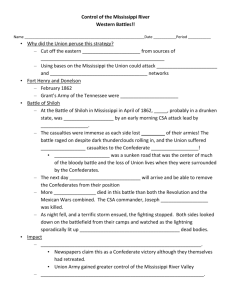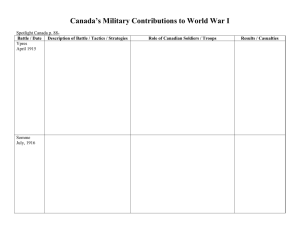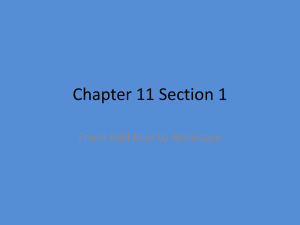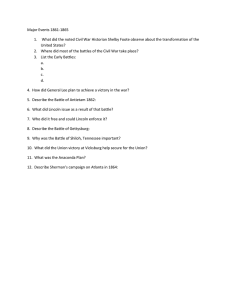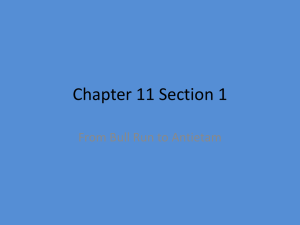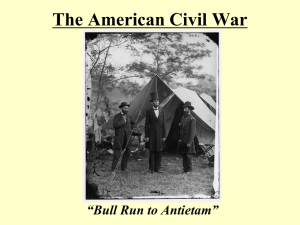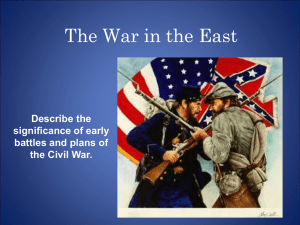Important Battles of the Civil War
advertisement
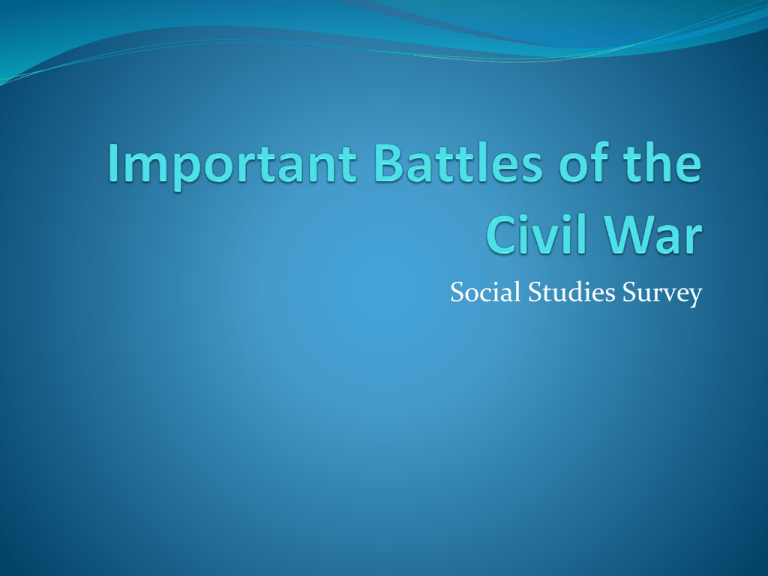
Social Studies Survey I CAN: Explain the significance of major battles that happened during the Civil War 2. Analyze how the improvement of technology (such as the Minie ball) but the lack of improvement in war strategy lead to massive casualties unlike any seen in American History 1. Fort Sumter (SC) Battle of Fort Sumter (April 12, 1861) Begins the Civil War Confederates demanded that Fort Sumter surrender Union troops refused Confederates opened fire April 13 – Union surrendered Started the 4 year war 4 more states join the Confederacy after the Battle of Fort Sumter (AK, TN, VA, NC) First Battle of Bull Run/Manassas July 21, 1861 (Virginia) Union Confederates 2896 Casualties 1982 Casualties Irvin McDowell Joseph E. Johnston and P.G.T Beauregard Victory Bull Run Cont. Thomas J. Jackson was given the nickname “Stonewall”: “There is Jackson standing like a stone wall! Rally behind the Virginians!” Defeat lead North to realize they needed a large, welltrained army Two names because North named them by natural resources and South by nearby towns, farms, etc. Battle of Shiloh April 6-7, 1862 (Tennessee) Union 13,047 Causalities U.S Grant Victory Confederates 10,700 Causalities Albert Sidney Johnston (highest ranking officer to be killed in battle) Battle of Shiloh Cont. Up to this point, bloodiest battle in American History (23,700 causalities) “Bloody Pond” probably not there; definitely not that bloody In Hebrew, Shiloh means “place of peace” Battle of Antietam/Sharpsburg September 17, 1862 (MD) Union Confederate 12,400 Casualties 10,300 Casualties General George B. McClellan General Robert E Lee Probably victory Battle of Antietam Cont. Bloodiest single day of war in American History (6,000 dead, 16000 wounded) General Lee’s battle plans were known in advance but General McClellan did not act upon this knowledge until it was too late Battle lasted for 12 hours (5:30 am- 5:30 pm) Crucial Victory for two reasons: British did not intervene for South and it convinced Lincoln it was time to end slavery Battle of Perryville December 8, 1862 (KY) Union Confederate 4220 Casualties 3401 Casualties Don Carlos Buell Braxton Bragg Victory Perryville Cont. Largest Battle fought in Kentucky Most Northern Battle and Western battle on Eastern Front Probably First time Henry repeating rifles were used Douglas MacArthur father fought at Perryville Maybe first monument dedicated to Confederate dead paid for by the US Government Battle of Chancellorsville April 30-May 1, 1863 (VA) Union Confederate 18,400 Casualties 11,400 Casualties General Joseph Hooker General Robert E. Lee Victory Chancellorsville Cont. Took over as Bloodiest Battle of Civil War General Stonewall Jackson was wounded by his own men; would die 8 days later Siege of Vicksburg May 18- July 4, 1863 (MS) Union Confederate 4,910 Casualties 32,492 Casualties US Grant John C. Pemberton Victory Vicksburg Cont. Cut the Confederate Army into two, especially on the Mississippi River Grant’s troops foraged for food while trying to capture the town of Jackson Victory came by putting the town under siege and waiting out the enemy Combined arms of US army and navy Battle of Gettysburg July 1-July 3, 1863 (PA) Union Confederate 23,049 Casualties 28,063 Casualties George G. Meade Robert E Lee Victory Gettysburg Cont. Lee lost more than 1/3 of his army at this battle Turning point and decisive battle for Eastern front Lee would be on the defensive for the remainder of the war Bloodiest Battle of the Civil War (51,000) 9 of the 120 generals were killed at Gettysburg 1/3 of all civil war dead photos were taken here Started without the consent of either General Lee or Meade Pickett’s Charge Mile-wide line that saw 7000 casualties in less than ½ hour Sherman’s March to the Sea November 16-December 21, 1864 Went across the state of Georgia leaving a 60 mile wide path of destruction Purpose was to show civilians in the South the horrors of war, hoping they would surrender Destroyed military targets, houses, crops, livestock, etc. Reached Savannah on December 21; it was Georgia’s first settlement Sherman’s Christmas Present to Lincoln: City of Savannah I am tired and sick of war. Its glory is all moonshine. It is only those who have neither fired a shot nor heard the shrieks and groans of the wounded who cry aloud for blood, for vengeance, for desolation. War is hell. - William Tecumseh Sherman
